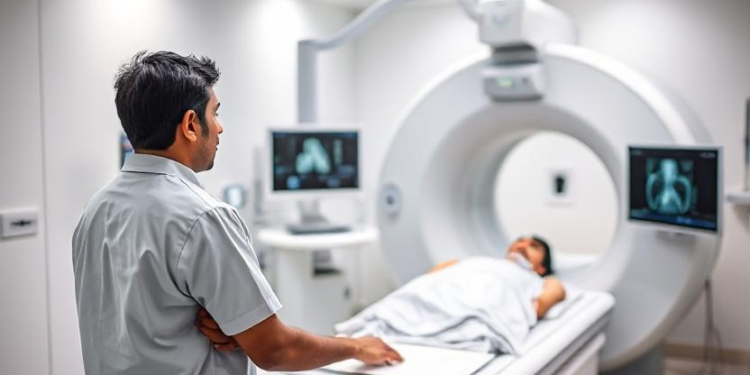The medical field is full of exciting and essential careers that go beyond becoming a doctor or nurse. One such highly respected and in-demand profession is that of a Radiology Technician. These professionals help diagnose diseases and injuries using advanced imaging technologies like X-rays, CT scans, and MRIs.
If you’re interested in technology, healthcare, and patient care, a career as a radiology technician could be a great fit. In this blog, we’ll break down everything you need to know — from the radiology lab technician course to eligibility and radiology technician course fees.
📸 Who is a Radiology Technician?
A Radiology Technician (also known as a radiologic technologist or medical imaging technologist) is trained to operate imaging equipment to capture internal images of a patient’s body. These images help doctors diagnose and treat medical conditions more accurately.
They work closely with radiologists, doctors, and other healthcare professionals in hospitals, diagnostic labs, and imaging centers.
🎓 Step-by-Step Guide to Become a Radiology Technician
✅ 1. Complete 10+2 with Science (PCB/PCM)
To begin your journey, you need to complete your 12th grade with Physics, Chemistry, and Biology/Math. Most institutes require at least 50% marks for eligibility.
✅ 2. Choose the Right Radiology Technician Course
There are multiple options available depending on how much time and investment you’re ready for:
- Certificate Courses (6 months to 1 year)
- Best for quick entry into the field
- Focused on basics of imaging and safety
- Diploma in Radiology Technician / Radiology Lab Technician Course (1–2 years)
- More detailed training than certificate courses
- Includes anatomy, imaging techniques, and hands-on practice
- B.Sc. in Radiology / Medical Imaging Technology (3 years)
- In-depth knowledge, ideal for long-term career growth
- Opens doors for further studies or specialization
✅ 3. Attend Practical Training / Internship
Hands-on experience is crucial. Most programs include internship opportunities at hospitals or diagnostic centers where students learn to handle real equipment and interact with patients.
✅ 4. Get Certified
After completing the course, you may need to register with local or national paramedical councils, depending on state regulations. Certification boosts your chances of employment in reputed hospitals and diagnostic labs.
💰 Radiology Technician Course Fees in India
Course fees can vary depending on the institute and the type of course. Here’s a rough idea:
- Certificate Course: ₹20,000 – ₹50,000
- Diploma in Radiology Lab Technician Course: ₹40,000 – ₹1,20,000
- B.Sc. in Radiology: ₹80,000 – ₹2,50,000 (per year in private colleges)
Note: Government institutes usually charge lower fees than private ones.
💼 Career Opportunities After the Course
After completing a radiology technician course, you can work as:
- X-ray Technician
- CT Scan/MRI Technician
- Diagnostic Imaging Technologist
- Radiology Assistant
- Lab Supervisor (with experience)
Work Settings:
- Government & Private Hospitals
- Diagnostic Labs
- Radiology Departments
- Imaging Centers
- Mobile Imaging Units
📈 Why Choose Radiology as a Career?
- High demand in both urban and rural healthcare setups
- Competitive salary and career growth
- Opportunity to work with cutting-edge medical technology
- Stable and respected profession
- Option to work abroad with additional certifications
🌟 Final Thoughts
Becoming a radiology technician in India is a great career move if you’re interested in a medical field that combines technology, science, and patient care. With growing demand for imaging services, enrolling in a recognized radiology lab technician course is your first step toward a promising future.
Whether you go for a diploma or a degree, make sure to choose an accredited institute and gain hands-on experience. The investment you make now — in terms of time, effort, and radiology technician course fees — can lead to a stable, fulfilling, and future-proof career.
more
While they may not wear the white coat of a doctor, Operation Theatre Technicians are essential to every successful surgery. Their attention to detail, technical knowledge, and dedication to patient care help maintain the smooth functioning of surgical procedures.
If you’re passionate about healthcare and looking for a practical, job-ready career — this is a rewarding path worth exploring. And if you’re already comparing options like dialysis course details or dialysis technician course fees, don’t forget to give OT Technician courses a serious look too!
While they may not wear the white coat of a doctor, Operation Theatre Technicians are essential to every successful surgery. Their attention to detail, technical knowledge, and dedication to patient care help maintain the smooth functioning of surgical procedures.
If you’re passionate about healthcare and looking for a practical, job-ready career — this is a rewarding path worth exploring. And if you’re already comparing options like dialysis course details or dialysis technician course fees, don’t forget to give OT Technician courses a serious look too!
While they may not wear the white coat of a doctor, Operation Theatre Technicians are essential to every successful surgery. Their attention to detail, technical knowledge, and dedication to patient care help maintain the smooth functioning of surgical procedures.
If you’re passionate about healthcare and looking for a practical, job-ready career — this is a rewarding path worth exploring. And if you’re already comparing options like dialysis course details or dialysis technician course fees, don’t forget to give OT Technician courses a serious look too!












